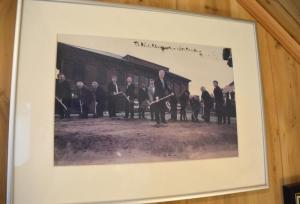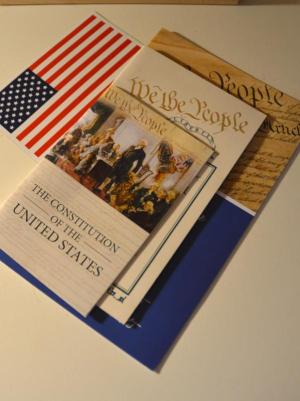Richard Claypoole was kid in candy store at National Archives
Born in Washington, D.C., on President Abraham Lincoln’s birthday, Lewes resident Richard Claypoole said he’s been a voracious reader and history geek his whole life. That’s why, he said, when he began working at the National Archives as a young man, he knew it was going to be a place he stayed for a long time.
“For me, having all these archives and documents, I was like a kid in a candy store,” said Claypoole. “I couldn’t have found a better job.”
Claypoole spent three decades with the National Archives. He began his career at the Federal Register in 1974, where he edited the public papers of Presidents Gerald R. Ford, Jimmy Carter and Ronald Reagan; he was the editor of the weekly compilation of presidential documents. In 1995, Claypoole was appointed to the position of director of the Federal Register and then served as assistant archivist for Regional Record Services.
He retired briefly in June 2001, before being brought back as assistant archivist for presidential libraries a couple months later. Ultimately, a few years later, he retired for good as director of presidential libraries, which at the time comprised 10 libraries, hundreds of millions of pages of documents, millions of photographs and nearly a million objects. There are now 15 presidential libraries, and the number of documents, photographs and objects has only grown.
Claypoole is a native Washingtonian and was raised in Silver Spring, Md. Both his parents were born in the city. His maternal grandmother lived off North Capitol Street.
“The first thing you would see was the Capitol building,” said Claypoole, of visiting his grandmother. “When I grew up there, it was a small Southern town.”
As the child of generational Washingtonians, Claypoole said he thinks his parents would have been pleased about his role with the presidential libraries. Both had died before he was appointed to the position.
“My father was a hard man to impress, but secretly he would have been pleased,” said Claypoole.
He and his wife Carolyn – another history geek who also worked at National Archives and is currently the executive director at the Delaware Agricultural Museum – moved to Lewes a little more than a decade ago. He said they first came to the area in the early 2000s.
“We’re prone to going on weekend day trips, and like a lot of people who move here, we fell in love with it,” said Claypoole.
Not surprisingly, Claypoole said there were perks that came with his job – attending special events, and meeting interesting and powerful people. However, he said, because he was a history geek, just being attached to the presidency was unbelievable.
“It was just fascinating to be in that position. To be able to go behind the scenes and to be a part of history,” said Claypoole.
While hesitant during the interview, Claypoole sent an email afterward saying he didn’t mean to avoid answering questions about the perks he enjoyed.
“It certainly wasn’t all work and no fun,” said Claypoole. “I’ll never forget the great pleasure of lunch at the American embassy in Paris with Teddy and Caroline Kennedy, and then the gala dinner that night in the Louvre celebrating the opening of an exhibit on the Kennedy presidency.”
A little more than half a dozen pictures of Claypoole’s time working with presidents adorn the walls of his second-floor office.
There’s a picture of Claypoole participating in the groundbreaking for President Bill Clinton’s presidential library. Everyone is all smiles in the photo, but, he said, it was pouring rain at the ribbon cutting.
There’s another picture of Claypoole shaking the hand of Clinton shortly after Clinton had taken office. Claypoole said there was always a bit of a transition from one president to the next, and Clinton was no different. After the formalities of introduction and just about as their time was up, he said, he wished Clinton luck on breaking 80 in a round of golf. Clinton’s tone immediately changed and he went into stories about trying to do that the week before, he said.
“He’s a man who puts his pants on just like everyone else,” said Claypoole.
There’s a small first-floor study just inside the entrance to Claypoole’s home. In it is a wooden bookcase stuffed from top to bottom. Books on presidents take up about half the bookcase, but all are history-related. Next to the bookcase, hanging in one frame, are two letters – one from Ford and one from Carter – signed by the former presidents congratulating him on his work during his tenure.
“Your experience at the National Archives has proved to be a big asset for the presidential libraries, and we have seen the results here in Atlanta,” reads the letter from Carter.
At this point, most of Claypoole’s contacts are no longer working for the National Archives, which means from a distance he doesn’t have too much of an opinion about the ongoing issues related to removal of classified documents by former President Donald Trump, and President Joe Biden while he was vice president.
“I would have handed in my retirement papers,” said Claypoole jokingly, when asked what he would have done if he were still in charge. “You know as much as I do.”
Claypoole said he was and wasn’t surprised to hear of classified documents being found. Procedurally, he said, he would have done pretty much exactly what was done – contacted the Department of Justice once it was discovered that classified documents had been taken. However, he did say, to the detriment of the public, he thinks there’s been an over-classification of documents taking place for years.
During Claypoole’s tenure, there was one instance of someone removing classified documents from the National Archives – Sandy Berger, an attorney who was a national security advisor to Clinton.
Claypoole said Berger took documents from the formal report on the 9/11 attacks that didn’t put Clinton in the best light when it came to how he handled information prior to the attacks. The building was under construction at the time, so he stuffed some documents in his socks and put them near the construction area to be picked up later, he said.
“So we set up a sting and ended up catching him,” said Claypoole.
Looking back on his career and accomplishments, Claypoole said it was always about preserving history, and working so closely to it was serendipitous.
“I never get tired of seeing the Capitol building,” he said. “For geeks like me, I’ll never lose that.”
Chris Flood has been working for the Cape Gazette since early 2014. He currently covers Rehoboth Beach and Henlopen Acres, but has also covered Dewey Beach and the state government. He covers environmental stories, business stories and random stories on subjects he finds interesting, and he also writes a column called Choppin’ Wood that runs every other week. He’s a graduate of the University of Maine and the Landing School of Boat Building & Design.



























































